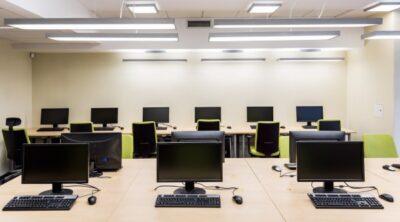Do computer labs in schools still make sense in 2023, and do they still function 5 years after opening?

This post was sparked by an interesting comment on LinkedIn in response to a government minister opening a new school computer lab at a rural school, and saying it is essentially a PR gimmick!
He did not go into specifics except to quote another one that was opened a few weeks before, and it is an “empty vessel”.
But he voiced something that many suspect and may not really have vocalised. We know there are good intentions (a blend of PR and a hope that this makes a difference) but what is the impact of these labs, and how long do they actually keep operating in reality? Are there any follow-up surveys conducted annually to check on this? In many cases, such initiatives are just “pushed” into schools by external actors with good intentions, and there is no real planning around the long term sustainability or measuring the success of such labs.
I’ll reference two posts below which are penned by actual educators, one of whom was situated at a rural school themselves. The bottom line is there is still a need, but it seems to depend on how the lab is integrated with, and complimenting, classroom teaching. Times have also changed a lot, with many learners now having their own mobile computing devices, even if it is just a tablet or cellphone.
If we look at the rise of early tech leaders like Bill Gates, many of them learnt what they did from shared computing resources. They had no computer or even cellphone of their own. The question is, are learners with this type of aptitude identified and allowed to innovate using the computer labs?
Also, having 25 standard Windows computers all teaching only Office365 is to me defeating the object of the exercise. That teaches kids to succumb to Microsoft and really reminds me of Pink Floyd’s song “Another Brick in the Wall”. I used to play that song flat out when I got home from school. Learning computers needs to be innovative and creative, and be teaching actively about changing things, doing things differently, and creating things.
The irony is that to learn and create often comes from having very little and needing to invent something to work like a pair of pliers, a hammer, a saw, and some wood. Young kids really love to create things.
What about rather (or at least also) having Raspberry Pi computers with free Linux, free LibreOffice, Python, FreeCAD, Home Assistant, or maybe even Sweet Home 3D (for redesigning their parents’ home), on them to learn about dissecting and changing software, and also creating fun applications all on completely free software. It is software that those kids can use in their businesses one day at no cost. What about, learning about open source licensing? Maintenance costs are low, and there are no software license costs at all, making it more sustainable over the longer term.
They can even have fun changing that software, and learning how to submit improvements upstream to sites like GitHub. Remember Mark Shuttleworth from South Africa? This is what he does today as his global business, building Ubuntu Linux. How many learners in South Africa today know who Mark Shuttleworth is, or what Ubuntu Linux is, and where it came from? I’ll just mention Impi Linux, and leave that here.
For me, the most important lessons are around creativity, making something with very little, and seeing what you can do with what you have.
Of course in South Africa, crime and security are a big issue, and I’d guess that 25 Raspberry Pi’s are a smaller temptation to steal, and easier to lock away (they’d all fit inside the school safe).
But as one of the articles stated, do schools that are getting computer labs, already have a school library? Often this is not the case and a school library sparks creativity, knowledge and inspiration amongst the broader segment of learners. Books and a love of reading really needs to be cultivated as a first foundational step. If not, a good school library should be the first step before a computer lab. Books can be taken home and read slowly to absorbed information, and the information is presented in a structured way to boost learning.
The two articles I referenced are https://www.edutopia.org/blog/pros-cons-computer-labs-mary-beth-hertz and https://www.iste.org/node/6758. Neither call for labs being obsolete, but they do call for more thought about how they are implemented.
Comments